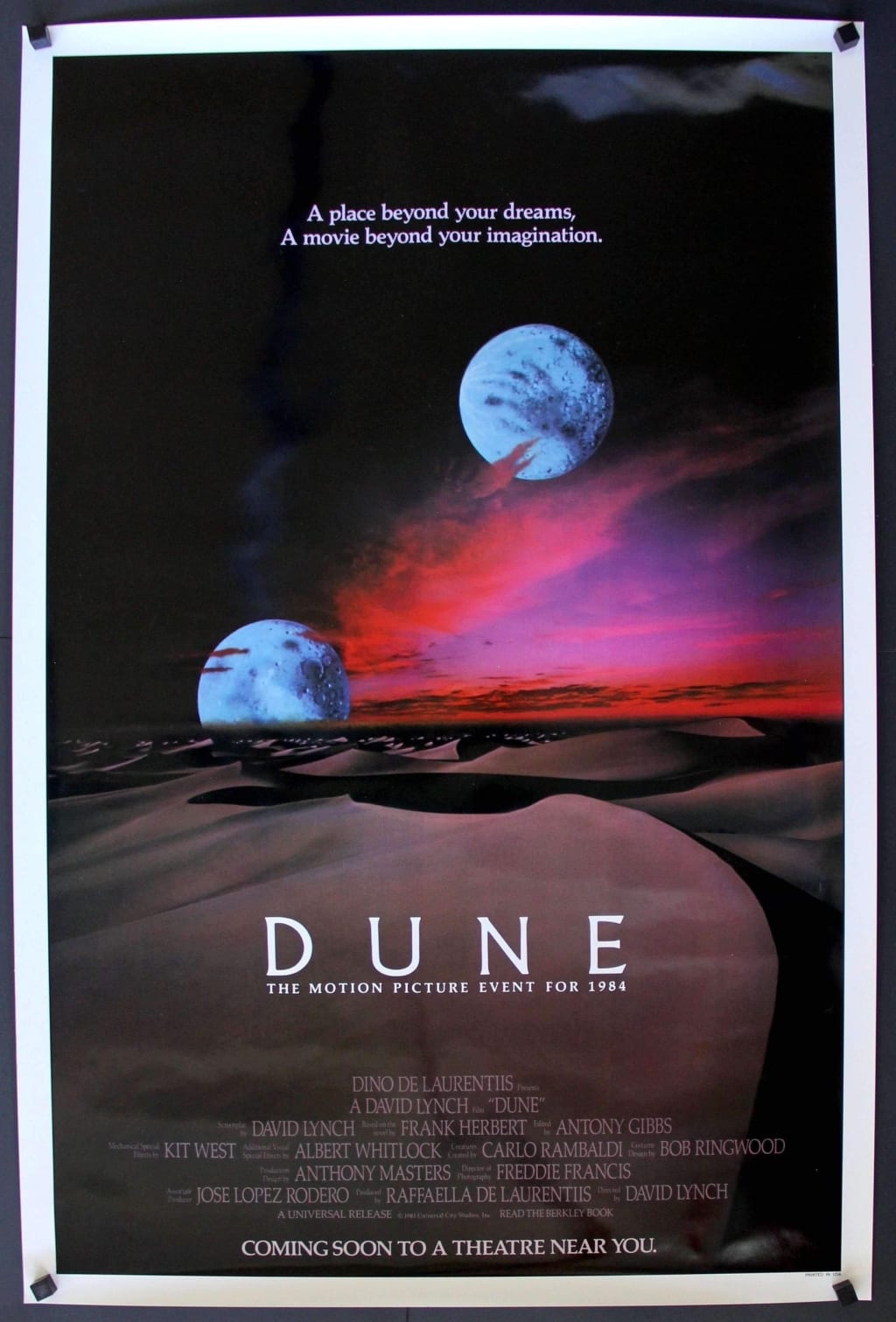
Dune, the epic science fiction classic penned by the redoubtable Frank Herbert, is a vast, mind-boggling melange of elements borrowed from Shakespeare, the Koran, classical mythology, ecology, and late Sixties psychedelia. Even a cursory examination of the plot can leave one feeling lost in a labyrinthine novel of sandworms, spice, Fremen, Third-Stage Guild Navigators floating in gassy tanks of green, and the power and might of the God-Man, Mu'adib, named after "the mouse shadow on the second moon."
I well remember when the film was first released. I remember the dark, mysterious spectacle of the trailer in the movie theater. I also remember feeling the film to be rather grotesque, baroque; bizarre, as far as the sorts of science fiction fantasies I was use to at the time. Helmed by David Lynch, the "wunderkind" auteur that brought Eraserhead and The Elephant Man to international acclaim, Dune was an unmitigated mess in its initial form: a strange, often stilted, and ugly film, reveling in the obscure profundity of its inscrutable dialog, poor special effects, and mind-numbing running time, one that revealed a story shot full of holes and quite, quite puzzling to any auds still in the theater by the time the thing wrapped up.
To cut the to the chase, Dune is cerebral and surreal, ugly and cyberpunk; grotesque and avant-garde and confusing and, yes, often very slow, meandering and inscrutable. The story? Something like this:
In the Galactic Year 10, 191, the "known universe" is ruled by a crotchety old Emperor (Jose Ferrer, in an excellent and regal turn) who is so put off by the Duke of Caladan, Leto Atredies (Jurgen Prochnow), that he makes a deal with the hideous bad guys of the Harkonnen clan, to leave off their mining of the so-precious "spice", the sacred, priceless substance that is the most important in the universe. It "extends life, expands consciousness" and enables the grotesque mutants of the Spacing Guild to "fold space." Still with me?
The Atredies are given the ownership of the ONE planet in the entire UNIVERSE where the spice is found--Arrakis, Planet Dune, where the entire world is one parched desert and gigantic sandworms plunge in and out of the ground, devouring everything. Along the way, we meet Bene Gesserits (a weird, nun-like sisterhood of soothsayers and priestesses), and the Atredies royal family, Paul (Kyle McLachlan in his first turn for David Lynch), Jessica his mother (Francesca Annis), and the loyal "Men-At-Arms" such as Gurney Halleck (Patrick Stewart, before he became the immortal science-fiction icon Jean-Luc Picard) Thufir (Freddie Jones), and Dr. Yueh, (the late Dean Stockwell), who is the Judas figure.
Yueh the traitor schemes and finally kills the Duke, leaving the Atredies headquarters on Arrakis "wide open" and unshielded. A furious attack ensues, and Paul and Jessica escape into the desert. There, they are adopted by the Fremen, bands of desert people who believe Paul to be their messiah spoken of in prophecy. And, guess what.
Paul transmutes the "Water of Life" and eventually leads the Fremen against the spice mining that has now been taken over yet again by the monstrous Harkonnens. They bring spice mining to a standstill, and Paul, the Messianic Leader, now has the Emporer himself by the balls.
Paul is the "Kwisatz Haderach," the "Universal Super-Being" now. He finally makes it fucking rain.
That's sort of Dune in a nutshell. One would be remiss NOT to mention the dazzling spectacle of the film, the costumes, set design, creatures, and the cinematography that opens up spectacular and often bleak industrial worlds, vast desert caverns, underground citadels, and strange warps of space and time. Also, the performance of Kenneth McMillan as the floating, pock-marked, and disease-ridden fat man, Baron Harkonnen, as well as Sting as his sinister, punkish, leather-clad nephew Feyd. They both radiate cowardice and sinister, mockish evil. Other notable cast members are the lovely Sean Young (who had already taken a turn in sci-fi for director Ridley Scott in 1982's Blade Runner, with Harrison Ford), Max Von Sydow as Kynes, Linda Hunt as Shadout Mapes, and Silvana Mangano, as the Fremen Reverend Mother. There is a bit part played by "Eraserhead" Jack Nance.
Dune was universally panned and considered a monstrous Turkey when it was first released; a huge failure. Herbert himself is said to have liked the film, but Lynch hates it, calling it in one interview, "the point at which I started selling out."
But it is hardly that. The film has an undeniable power and dark if oppressive appeal. Lynch's montage of surrealistic and dreamlike images (floating hands, dripping water, the folding of Paul's inert body as it floats through hyperspace) mark it as undeniable the work of a visionary. In between, we have the story of a Shakespearean drama of tragedy and betrayal, blended with the mythological aspects of the idea of the "Coming Messiah" which is at the center of religious faith. Paul is cast out of his rulership, only to return as the avatar of God upon earth--to avenge his murdered father and reclaim what is his. And, to change the face of the Known Universe.
The problem of the film for those expecting simple entertainment is that Dune, in even its most stripped-down and easily-digestible form, is simply too complex. It is a heady and heavy mix of mysticism, psychedelia, science fiction, political intrigue, and mythological and classical tropes that are timeless and baroque. Add to this the visual darkness engendered by Lynch, the surrealistic reliance on images of Paul's "inner journey", and the oppressive, sometimes joyless majesty of the film, and you have a recipe for box office disaster.
The performances are excellent; the creature design by ET's Carlo Rambaldi, grotesque and highly disturbing. The film is often ugly, a post-industrial and cyberpunk nightmare of worlds covered in factory machines, sadomasochistic tortures, and rubber-hose-wearing "Sardaukar Terror Troops." In other words, it does not float lightly in the eyes or on the brain.
The spaceships seem a bit threadbare; but Dune isn't a "Space Film," such as a Star Trek or Star Wars movie. The flights through space are incidental to the plot; they are merely to move the action along. The movie is, instead, an examination of the mystic inner rebirth of a young man who finds he possesses incredible and unknown faculties of being. In that respect, Dune is, ultimately, one of the most incredible films of the 1980s, and an epic cinematic journey worthy of Fritz Lang, or Stanley Kubrick.
I watched a three-hour "fan edit" of the film after dreaming of it. It took me to a place I hadn't been since a very young boy. Has the Sleeper Awakened? I don't know. But, at the very least, he has stirred.
About the Creator
Tom Baker
Author of Haunted Indianapolis, Indiana Ghost Folklore, Midwest Maniacs, Midwest UFOs and Beyond, Scary Urban Legends, 50 Famous Fables and Folk Tales, and Notorious Crimes of the Upper Midwest.: http://tombakerbooks.weebly.com






Comments
There are no comments for this story
Be the first to respond and start the conversation.